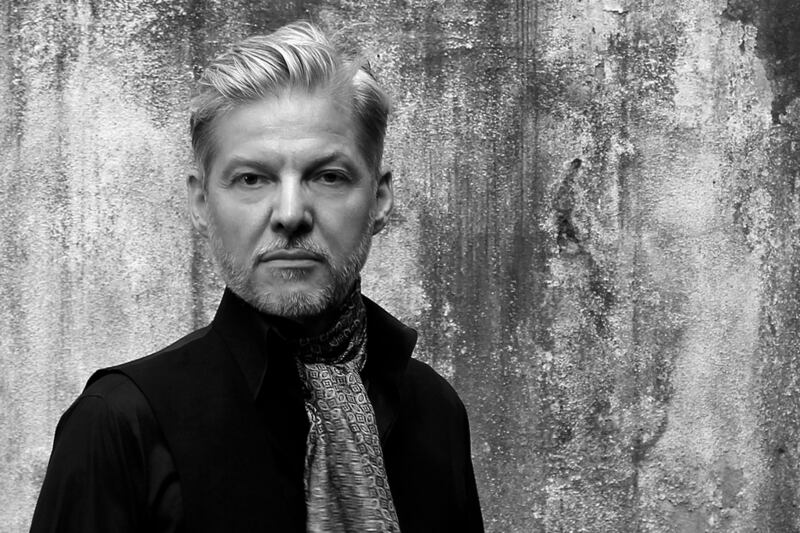Box sets, with their handsome packaging of long careers, are generally the preserve of the venerated rock group. Gas, one of the projects of Cologne artist/electronic musician Wolfgang Voigt, challenges that assumption. His initial four-album output has been boxed not just once, with the tidy CD set Nah Und Fern in 2008, but again last year with a super-heavyweight set of 10 vinyl LPs, Box.
Rather than honouring a long career, these sets memorialised a project of a grand and serious vision, the output of four years between 1996 and 2000. In that time Gas (a pseudonym for Voight), made music that could be measured on a spectrum, from dark to bright – concluding with the polished Pop album from 2000 – all united by an engrossing signature sound.
In an exemplary Gas composition, you will likely hear a grand orchestral sample, which is allowed to balloon and billow across the full width of the sound picture. The music is processed into abstraction, this breaking down of detail taking upwards of 10 minutes – a development as gradual as it is beautiful, as it generally is melancholic. While this change takes place in a scenic, fluid space, the composition is given a sense of solidity and purpose by the discreet and driving pulse of a distant 4/4 drum, locking in as intuitively as a heartbeat.
It is music both buoyant and robust and it can bear the weight of metaphorical intrigue that has been invested in it – sometimes by its maker, often not. In the past, Voigt has claimed that the – now unrecognisable – source material for his orchestral samples come from German classical sources such as Wagner and Berg and also that he has placed within it elements from schlager, a type of sentimental song particular to Germany. The original Gas albums came housed in cover art as heavily-processed as the music. They were pictures of native forests: often beautiful, often rather forbidding. Covertly, he seemed to be exploring concepts of national identity.
For an artist such as Voigt (who co-founded the Kompakt label), there are obviously solid business reasons for reactivating a project with a proven market, ready to buy a release like this, which will be offered in a deluxe 3LP vinyl hardcover set. No reason has been given for the first new Gas album in 17 years, but at a time where the world is troubled by the stirring of nationalist feeling, an album such as Narkopop – capable of consoling beauty, but also a troubling drama – feels timely for more serious reasons.
Indeed, during the album’s hour-plus length, Voigt keeps us in a state of suspense – theatrically managing the balance of light and dark. Throughout, we are drawn to a hauntingly simple three-note refrain that is cast in different lights by its different contexts – we perceive it as a less ominous proposition in track eight for example, than in track one.
Though it has power to lull and entertain, Narkopop is neither pop nor narcotic – its uneasy shifts in mood instead require us to remain vigilant. At times (as on the dense fourth track), you might be reminded of works such as Shostakovich's fifth symphony, in which external political pressures exerted themselves in the exaggerated formality of the music. On this album, that feeling manifests itself in the drums, once a reassuring staple of the Gas sound. On track five they sound a crushing bombardment. Part military action, part manufacturing process, they sound a warning note on how mechanisation might crush humanity.
So spacious and sumptuous is this music, however, it is never oppressive or didactic. The album reveals itself gradually, unfolding with the leisure of an epic film, with its scenic spaces allowing opportunity for contemplation. You will hear great beauty (on track three you could swear you hear the wind in the trees). Track seven, meanwhile, recalls the guileless clarity of the Pop album, while track nine is a cloudy drift. Still, the presence of this beauty should not make us complacent.
The eighth track feels particularly instructive. It begins with a low and ominous chord, which gradually eases its hold with a familiar theme and a distant heartbeat of drums. There’s a welcome sense of release, but we’re reminded that even if we’re granted a view of dramatic scenery, it’s not without peril – a loss of our footing at this height could be disastrous.
It’s a fine balance, but over the course of the thrilling 17-minute closing track, it appears that things might work out for the best. The song begins with an intent cavalry gallop, but triumphant brass flourishes soon announce the arrival of a rejuvenating force. Over the romantic fading in and out of the strings over the next quarter hour, the heavier intimations that we’ve felt elsewhere in the record recede, and a magnificent positivity shines through. At times, it has seemed that Voigt’s forest has concealed monsters, but we leave it calm and restored.
John Robinson is associate editor of Uncut and the deputy editor of History of Rock. He lives in London.





